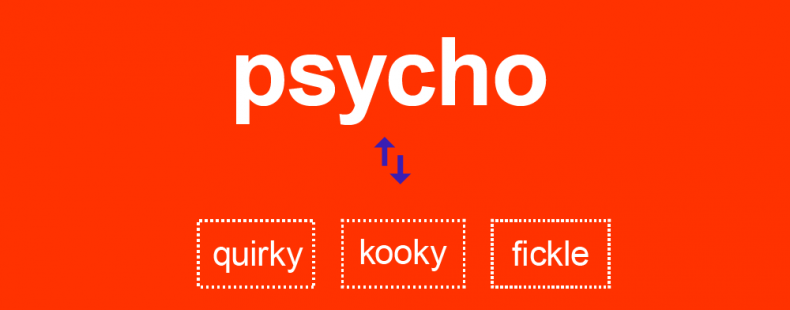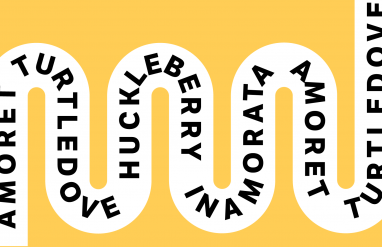Psycho, when used as a noun, refers to “a crazy or mentally unstable person.” As an adjective, it describes a subject that’s “psychopathic or psychotic.” In fact, the word was first recorded in the 1930s as an abbreviated form of the terms psychological or psychotic. Since then, psycho has developed into one of pop culture’s favorite words to conjure up images of menacing killers and monsters that go bump in the night.
The word is perhaps most synonymous with Hitchcock’s iconic 1960 thriller Psycho, which continues to inform contemporary filmmakers’ approach to the genre. Both its haunting cinematography and the shocking death of the film’s heroine helped solidify the word’s implication of danger or violence.
But there’s been a recent push by mental health advocates to challenge how people use pejorative language that reinforces negative stereotypes of mental illness. (You can read more in “Better Words To Use Instead of Crazy.”) To help you avoid using insensitive language to describe someone’s emotional state casually, we assembled a list of synonyms for psycho that will add more clarity and color to your vocabulary.
quirky
First recorded in the early 1800s, quirky is an adjective stemming from the word quirk, which means “a peculiarity of action, behavior, or personality.” It offers a great option to describe a subject that’s unique or unusual in an endearing way.
Wrong: My dad’s always criticizing my brother’s psycho clothes. He says he shouldn’t wear a dog collar and leather pants in public.
New sentence: My dad’s always criticizing my brother’s quirky clothes. He says he shouldn’t wear a dog collar and leather pants in public.
capricious
From the Italian word capriccioso, capricious means “subject to, led by, or indicative of a sudden, odd notion or unpredictable change.” It’s a fantastic adjective to pull out when you want to describe a subject’s erratic or flighty temperament.
Wrong: The president of the homeowners association is a psycho. She keeps flip-flopping on her vote to install a new stop sign on Main Street.
New sentence: The president of the homeowners association is capricious. She keeps flip-flopping on her vote to install a new stop sign on Main Street.
kooky
Kooky, meaning “eccentric, strange, or foolish,” offers a lighter alternative when describing a subject’s unconventional behavior. This wacky word is a relatively new, turning up in the mid-1950s, perhaps as a variant of cuckoo.
Wrong: My cat is such a psycho! She runs around the house every night at 2 am.
New sentence: My cat is so kooky! She runs around the house every night at 2 am.
fickle
Fickle is defined as “likely to change, especially due to caprice, irresolution, or instability,” or “not constant or loyal in affections.” Although not an attractive characteristic, fickle doesn’t have the same health connotations as psycho or crazy, making it an excellent alternative for your vocabulary.
Wrong: My boss can’t give me a clear answer on anything. He’s such a psycho.
New sentence: My boss can’t give me a clear answer on anything. He’s so fickle.
agitated
From the Latin agit?re, meaning “to set in motion,” agitated is an adjective meaning “excited or disturbed.” Even though there’s a sense of volatility in the word agitated, It’s still a more thoughtful way to describe a subject’s shifting or erratic emotional state.
Wrong: If you want to see me act like a psycho, try talking to me before I’ve had my morning coffee.
New sentence: If you want to see me agitated, try talking to me before I’ve had my morning coffee.
oddball
Oddball is maybe the most pleasant word on this list. As a noun, it refers to “a person or thing that is atypical, bizarre, eccentric, or nonconforming, especially one having beliefs that are unusual but harmless.” As an adjective, it describes a subject that’s “whimsically free-spirited, eccentric, or atypical.” Is it a silly word? Sure. But the whimsy of oddball is what makes it a fun replacement when your first instinct is to use psycho.
Wrong: When my son skips his naptime, he starts acting like a little psycho!
New sentence: When my son skips his naptime, he starts acting like a little oddball!
Language is a powerful tool. That’s why it’s essential that as a culture we continue to reevaluate and evolve our vocabularies. Especially when our word choices may offend or alienate people. Thankfully, the world is full of vibrant and thoughtful words to help express yourself clearly and thoughtfully!
Curious about other lexical upgrades you can be making now? You can try putting cute aside for some preferred alternatives. Or, how about upgrading how you talk about yourself by transforming those negative traits into positive ones?














